An Interview with Sophia Le Fraga
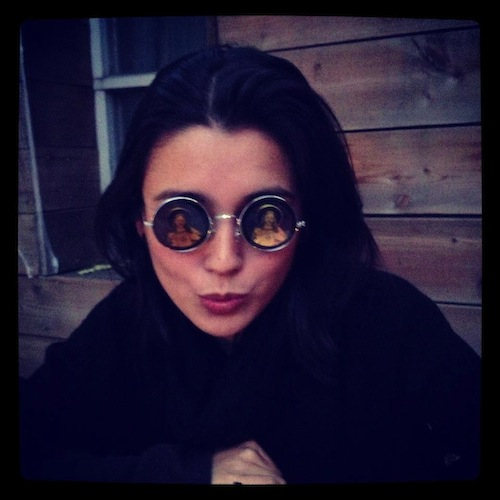
Sophia Le Fraga’s I RL, U RL has just been released from Minutes Books.
Andrew Worthington:
Where are you right now?
Sophia Le Fraga :
I am…FUCK…I am at work, at the Hearst Tower.
AW:
What’s your job?
SLF:
I’m a copywriter and editor at this digital ad agency.
AW:
How’d you get that job? What sorts of ads do you do?
SLF:
Well so, I studied Linguistics at NYU and when I graduated, I was just all over the place, traveling up and down the California coast kind of like aimlessly, and one day this guy called me and was like, “oh NYU said that you could tutor me in Syntax and Semantics”, and I was like, “Yeah sure” and he was like, “ok be in touch when you’re back.” And when I got back, I hit him up to tutor him a couple of times a week, and when we met he was like, “I’m the SVP of this ad agency, do you want to just like… work for me?” And I was like, “Well it’s not like I’m doing much of anything else…” So that’s how I ended up here. I do all kinds of ads, from skin care stuff to like cable and internet stuff to banks and cancer treatment centers…it tends to be…an eclectic bunch.
AW:
Did you take writing classes when you were in college? Or was writing something you did on the side sort of?
SLF:
Yeah totally. NYU didn’t offer a Creative Writing major but I pretty much took enough credits to double up. I took a lot of poetry, some fiction, and for two years, did an independent study with Rob Fitterman on “Poetry of the Avant-Garde”. I feel like writing was always what I wanted to do, but I wanted to have the background in Formal Linguistic to kind of… better understand what I was doing.
*Linguistics
AW:
Can you describe some of the ways you may go about writing poetry? How did you compose I DONT WANT ANYTHING TO DO WITH THE INTERNET?
SLF:
Well, so, I DON’T WANT ANYTHING happened after I submitted a sort of “open call,” asking everyone I knew on Facebook, Twitter and e-mail if they wanted a “poem”… and depending on what medium they responded in, I took from their feed, or their wall, or their e-mail and gave them each a poem of sorts, using only their language. People love to hear themselves talk.
AW:
So I guess no one was upset with the poem you made for them, then?
SLF:
No, of course not! All I gave them was a word salad of whatever they’d already shared on the web.
But that’s not to say that people haven’t been upset with me. That’s all pretty extensively catalogued in “H8M8” [a section in I RL, U RL].
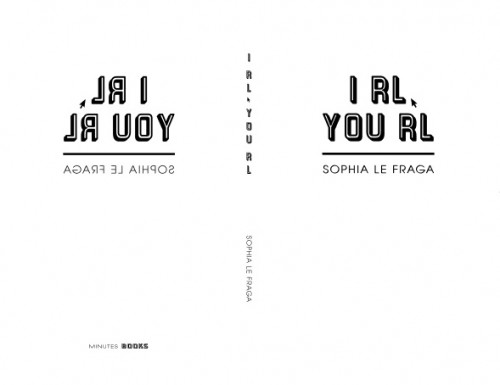
25 Points: Götterdämmerung Family BBQ
 Götterdämmerung Family BBQ
Götterdämmerung Family BBQ
by Jasper Bernes and Joshua Clover
Commune Editions, 2013
read, print
1. I met Jasper Bernes at a café in Oakland. He was binding Götterdämmerung Family BBQ with a long arm stapler. Commune Editions is a new publishing venture organized by Jasper Bernes, Joshua Clover, and Juliana Spahr.
2. Jasper invited me to the Poetry and/or Revolution conference-taking place at UC Berkeley, Davis, and Santa Cruz. I went to a discussion on manifestos where Joshua Clover delivered his Don’t Put the Rabbit in the Hat. Later, at “The Public School” Joshua and Jasper read from Götterdämmerung Family BBQ.
3. If it’s not clear you can read this online here along with works by Juliana Spahr, Diane Di Prima, and Louise Michel.
4. Poems. These are poems. Don’t forget. They look like poems. They taste like poems. They’re also full of frenetic pop culture references and blatant political antagonisms. They’re fun, but they’re trying to fuck shit up all the same.
5. The line that got the biggest cheer / laugh / reaction from the reading was “I wandered lonely as a drone / That floats o’er jails and landfill / And monitors what we say on the phone. // It knows an amazing amount / About One Direction / And sexting with frenemies of / the public good, who burn in the sun // of total transparency, / brains open to the screen / Memories of one Friedrich von / Ludwig von Mises on scene…”
6. There’s a kind of opulence to lyric like that – a lyrical richness, a sickly sweetness from the rhyme, an excessive beauty. Some other writers, like Julian T. Brolaski, and Joyelle McSweeney, also capture a kind of perverted poeticism, a lavish absence, bastard cousin of luxury rap. “I’m early to the party but my ‘rarri is the latest.”
7. While “I wandered lonely as a drone” pleases, much of the rest of the chapbook is more of a call to arms and a more vigorous critique of political ambivalence. “Your vocabulary did this to me and millions like me, the vulnerability of words wanna be starting something else: rockets, rain, renegacy. Turn it upside down and set it on fire / is too a solution if you believe in emotional truth”
8. Responsibility, commiseration, complicity. This work sits firmly on the let’s do something with our poetry side of the aisle, rather than the “everything is meaningless” or the “poetry can’t do real shit” side of the weird looking aisle.
9. Jasper told me that Commune Editions would focus on work with an anarchist lean. Publishing a recounting of the trials of Louise Michel achieves that in more than one way.
10. “We once thought that there was more to life than breathing carbon emissions through the holes in our faces and we were right” READ MORE >
October 31st, 2013 / 12:31 pm
25 Points: Gulag
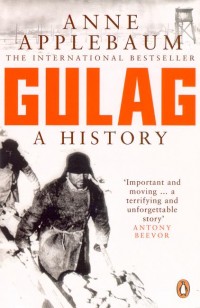 Gulag
Gulag
by Anne Applebaum
Anchor Books, 2004
736 pages / $18.95 buy from Amazon
1. Roughly speaking, the Gulag was the soviet prison camp system that operated from about 1919 through the late 1950’s, though some camps lasted right up until the collapse of the Soviet Union itself
2. Anne Applebuam, the author of this work, has never been a prisoner in a Gulag. In fact Applebaum is pretty much the total opposite of most people who were in the Gulag system, who were by and large poorer Russians and eastern europeans of various national origins. Applebaum is a member of America’s patrician class. She went to Yale and Oxford, worked as a foreign correspondent for The Economist, and is married to the foreign minister of Poland.
3. I can’t help but wonder if one reason Applebaum decided to tackle such a grim, destitute subject is because, like many people who have a fairly secure, lofty station in life, they are morbidly fascinated by the sheer horror of tragedies beyond their geographic and chronological frame of reference. (note: while I am not a member of said lofty station, I am not currently starving to death and am myself often fascinated by horrific national tragedies)
4. I don’t want you to think that Anne Applebaum simply wrote this book out of some universe of vast privilege and is just sort of casually looking down and and trying to explicate history like the Queen of England talking about what’s happening in Syria with the Prince of Wales at afternoon tea or something. The Gulag system as a topic is so enormous, so horrifically cruel and violent, that she obviously had to submerge herself into it to a degree and for a length of time that most people, let alone most writers of history, would probably find appalling.
5. To be honest, I think her outsider status here works to her advantage more than anything. Most of the Russian language works about the Gulag she cites are very emotionally powerful, but they tend to become monotonous and sort of blend all together in a single,very Slavic voice of total despair. You can only read so many descriptions of old women bitterly weeping while receiving their daily bread ration before it becomes this easily dismissible rhetoric of misery.
6. This book is about 700 pages long. About 110 pages of that length is source notes and bibliographical information of one kind or another. Anne Applebaum offers a tidal wave, like an actual wave that engulfs you, of background information and first hand accounts of what life was like in the Gulag system.
7. While reading it I kept wondering if I would ever have it in me to write a 700 page long book of which 1/7 is pure reference information. I mean, I get that people do that sort of thing for a PHD, but that is presumably a big incentive to finish a book. Did she get some kind of advance for this? Or was this just a kooky little pet project she nursed along for years on her own?
8. This is the single most painful work of non-fiction I have ever read.
9. No, really.
10. If the perpetrators of the Holocaust were, as Hannah Arendt famously wrote, committing the banality of evil, then the Gulag system is about the banality of apathy. At no point was the cruelty of the system or of the administrators of the camps or the guards ever mandated. The purpose of the Gulag was never that of the Nazi camps (even if they do bear horrific similarities), in fact, the actual idea of what this whole prison camp system was for fluctuated a lot over time. Sometimes it was about trying to rehabilitate prisoners, sometimes it was about using their slave labor to turn a profit, sometimes it was just about getting rid of undesirable elements and sending them 10 time zones away in the arctic waste. Though that last thing is literally the only thing it did that actually worked. READ MORE >
October 29th, 2013 / 12:15 pm
An Interview with Sean Thomas Dougherty
I first met Sean Thomas Dougherty at my first AWP conference, Denver 2010. I had been wandering the overwhelming aisles of the Book Fair, wondering what I had gotten myself into, when I found myself at the BOA table. A book called Sasha Sings the Laundry on the Line caught my eye. That mesmerizing title with the Eastern European name, the cover art of colorful dresses and towels hanging between sooty apartment buildings, a wedge of blue sky above – it reminded me of my old neighborhood of Midwood, Brooklyn, and when I picked up the book I read the name. This was a guy whose poems I had long admired, and I hadn’t realized he had a new book out. When paying for Sasha, the BOA rep behind the table asked, “Would you like Sean to sign it?” I told her I needed to get going, but then she pointed behind me: reddish hair under a cool hat, big hooded sweatshirt, pale blue eyes, warm smile: Sean Thomas Dougherty. Signing his book, Sean wanted to know my story right away. He lit up when I told him I was a college dropout. “You’ve got to put that in your author bio,” he said.
Sean and I have kept in touch since Denver, mostly via email and Facebook. Sean is hands-down my favorite Facebook presence. His barbs at mediocre poetry, his posts of music videos on his “Punk Rock Sundays,” and his constant promotion of indie magazines and presses, as well as of the poets he loves, is something I look forward to daily. When I heard Sean had a new book in the works, I contacted him about doing an interview. That book, Scything Grace, is now out with Etruscan Press. Dougherty’s poems sing of the tough realities of American city life, with a voice influenced by Lorca and Vallejo, Levis and Hull, but a voice truly all his own. He draws close the lives and deaths of those he loves, and sees and hears the stories of the American poor and working class all around him. His poems from the beginning have challenged the division between poetry and prose, and are loyal to nothing if not sound, and great feeling. Poet Dorianne Laux has written that Dougherty is a poet “of grand and memorable vision . . . the gypsy punk heart of American poetry.”
In the following interview, conducted via email over a few days last May, Sean and I discuss Scything Grace, the line versus the sentence, Li-Young Lee, and the duende.
***
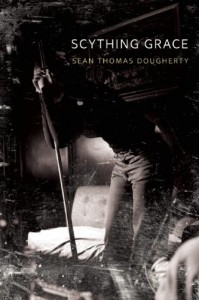 Justin Bigos: Your latest book of poems, Scything Grace, shows you continuing to push the formal possibilities of your poetry, as well as hitting what I hear as a more recent note in your work: the voice of an older, more self-aware poet, who carries his ghosts through the streets and witnesses language and song everywhere, as if the world were scripting itself, singing itself daily into existence. Can we start our conversation by looking at this book as the next chapter in your life’s body of work? How have you changed as a poet since Sasha Sings the Laundry on the Line?
Justin Bigos: Your latest book of poems, Scything Grace, shows you continuing to push the formal possibilities of your poetry, as well as hitting what I hear as a more recent note in your work: the voice of an older, more self-aware poet, who carries his ghosts through the streets and witnesses language and song everywhere, as if the world were scripting itself, singing itself daily into existence. Can we start our conversation by looking at this book as the next chapter in your life’s body of work? How have you changed as a poet since Sasha Sings the Laundry on the Line?
Sean Thomas Dougherty: This is a hard question for me because I haven’t really “read” Scything Grace yet. It is an improvisatory collage. So I will answer in an improvisatory collage, which is the way I’ve started to write more and more in the last decade. The way closest to how I think, how I feel.
Back in May 2012 I was walking with my friend the poet Corey Zeller at the park on the west side of Erie, Pennsylvania, where I take our children to run through the last cherry blossoms. Pale petals we are. Sometimes when I walk I will just start talking to Corey poems and he will say, write that shit down. And I say, no one time. The poem is now gone. I’ve been doing this for decades for my friends. I say I am a walking saxophone. I say I am the words hiding all around us. Monk once said he has a hard time not hearing the music, it is everywhere, he wants to reach up and catch it as it passes us by. Flea, the bassist from Red Hot Chili Peppers, says the same thing. Everything has a beat. Think of a billion living things, the smallest insects. Human hearts. The rush of traffic. A swallow’s wings sing the air. I actually “write” very little all year. I write maybe two months and then the rest of the time I live, I collect, I listen, but I say poems all the time. I think part of being a poet is to live the poem, so I spontaneously make poems for the people I care about. I make poetry part of the fabric of us.
In May 2012 I had just finished a grueling grind-out manuscript for BOA of my Selected Poems to appear in 2014. Some of the poems in there I had been crafting for over six years. Corey’s best friend Jeremy, who I had known for years too, had just hung himself. Corey was dealing with his death and trying to write poems in his voice. It was spring. We walked carrying such weight. My love Lisa was very sick. My second daughter had been born in January. My oldest, Amara Rumi, was four. She ran with Corey’s son Malcolm. To live in a city of rust along a lake between nations. Our children are a lake between nations. Corey said now that you have finished your Selected you should write a book the way you speak poems. Just riff them fast. But write them down.
I said, yeah like Sonny Rollins playing with the birds on the Williamsburg Bridge. Legend has it when Rollins felt stuck he spent a year listening and playing with the birds on the bridge. He disappeared into life to find a new sound, a new tone. I needed to find a new tone. To return into the improvisatory language that drove me to poetry thirty years ago. For decades I’ve been pulled into the river. Now I gave myself permission to not swim but drown in it. I was also interested in writing much shorter lyric poems. My love Lisa is very sick and her favorite poems are my shorter lyric poems.
So two very important people in my life pushed me to make this book of short improvised lyrics. Then I expanded the breath to close. It is a Book of Breaths.
I started with a quote from Cavafy. In many ways the entire new book Scything Grace was driven by these lines from Cavafy’s poem “The City” :
“…I see the black ruins of my life, here,
Where I’ve spent so many years, wasted them destroyed them totally.”You won’t find a new county, won’t find another shore.
The city will always pursue you.
I wrote 80 percent of Scything Grace in a sort of old school improvisatory haze fueled by the duende, black coffee, and cigarettes over four weeks in May 2012. After I was done, I hit spell check, told my friends I was sending it out. It was done. I wrote it linearly one poem after another, day after day, sometimes two or three poems per day. I sent it out on a Saturday night in late June, I think, to Four Ways Books, Etruscan Press, and Black Ocean Books. On Monday afternoon Phil Brady of Etruscan called me up ecstatic to accept it.
JB: I’m really interested in how you articulate some of the paradoxes of the poem – at least the kind you write and are drawn to – especially the paradox of the poem as something received yet also made. It is you, Sean Thomas Dougherty, writing these poems—but as a kind of conduit, a witness. In that sense, the writing seems less about arranging sound and experience than transmitting it. If this is true, how do you know when to improvise, when to guide, when to allow your own will in there to have its say?

STD: You can’t teach someone to make metaphors, but you can teach the structure and examine how they are made or why certain images arise from the imagination, the way the French phenomenologist Gaston Bachelard in his profound book The Poetics of Space points to rooms, windows, doors, spaces intimate and grand, the juxtaposition between things, between worlds. But in the end there is an unnamable space to the making, that is the human spirit, soul I dare say, history of language and learning, the imagination made manifest in words. But it is also the body. The body remembers. So while the mind may let go the body becomes an instrument of sight, and very particular for the poet, of sound.
25 Points: Vintage Attraction
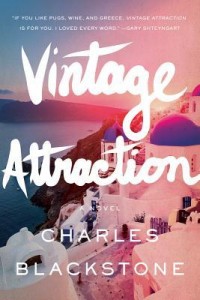 Vintage Attraction
Vintage Attraction
by Charles Blackstone
Pegasus Books, 2013
304 pages / $24.95 buy from Pegasus Books or Amazon
1. Charles Blackstone is the managing editor of Bookslut, which is a nice outfit with a long-standing thing going on and you can read them at: www.bookslut.com
2. I prefer to call him Charlie and he is fine with that.
3. This novel is about a guy who is in love with a famous girl in Chicago who is a wine expert and has her own restaurant thing going on and her own tv show and the guy contacts her as a fan and then they elope and then five weeks later he thinks she is cheating on him and also they aren’t even getting along really and then they are taking a trip to Greece together.
4. There isn’t any gore or devastating kind of art going on in it what it is instead is more of a vibe of like you’re on a second date with someone you really like and it’s a picnic and you just want to seem really nice because you actually think your date is really nice so you use proper grammar. Don’t even lie you know you look really cute when you dress up sometimes. I want to say this book has a tone you’d use in a job interview but that wouldn’t be helping anyone.
5. Also our narrator has an incredibly sad type of way about him which I am basically a complete sucker for but that is fine.
6. This guy in the novel is an adjunct professor.
7. It has this kind of little nervous guy thrown into a big city feel to it because he like asks this girl out and then they’re married and he has to keep up with her life.
8. Have you ever felt like you had to keep up with someone and was it exhausting.
9. I think this entire novel may be a metaphor for the history of wine. Tolstoy.
10. They’re running around Greece trying to either fix or break a marriage they’ve been in for five weeks. READ MORE >
October 22nd, 2013 / 11:09 am
Against Intramural Poetics, Poetry as Potpourri and Brooklyn Provincial: Josef Kaplan’s Kill List
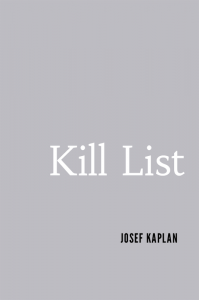 Kill List
Kill List
by Josef Kaplan
Cars Are Real, October 2013
58 pages / Available as PDF / Print Editions $15
It’s been a big year for lists in poetry. I don’t feel at all threatened or the least bit offended by Josef Kaplan’s most recent Kill List. In fact, it’s hard for me to believe anyone out there really would be. Flavorwire and Seth Abramson offended me much more. But of course, I am an oh-so jaded rich poet myself, and it’s the grandmas and granddads of U.S. Conceptual Poetry who have jaded me already. I have one urgent critique of Kaplan’s poem: and it’s that the work comes off as didactic, transparently so. And to argue for this transparency as a virtue in itself undermines the integrity of conceptualism as a vanguard movement worth rooting for in contemporary poetry. Maybe I care too much. But why not make the poem a hundred pages longer? Slam Poetry is similarly didactic…something like Elliot Darrow’s “God Is Gay” which was written up in Time magazine earlier this month. Both Darrow and Kaplan espouse a kind of viral poetics to provoke discussions about classism, racism/sexism etcetera. Darrow is a high-school thespian in North Carolina; Kaplan is part of a comfortable community of poets living in Brooklyn, N.Y. With Kaplan, it’s a witty uncreative self-awareness sharpened to a lethal edge. It’s a necessary prank, a deliberate faux pas; a pot shot at our naked emperor and his provincial court of intramural poesies. But it’s not enough.
The exciting thing Kill List accomplishes is its unique perpetuation across various comment streams and blogs online. In its first week, there have been some hilarious moments of response…one person arguing that so & so isn’t a rich poet because they only recently received tenure and the National Book Award, for instance. Some people are upset. Yes, the romantic idyll of the starving poet in a garret is entirely defunct. The trouble is that if someone is a poet and you know about them outside of your own inter-personal sphere, they’re mostly likely rich, because so much poetry is and always has been (not without the occasional, glorious exception…) for the most part conceived by and for an owning majority class. So much poetry is just like potpourri.
Here’s an attempt at close reading my favorite section of Kaplan’s poem. This stanza appears towards the end on page fifty-eight:
“Ron Silliman is comfortable.
Justin Sirois is comfortable.
Matthew Smith is comfortable.
Patti Smith is a rich poet.”
Patti Smith is a rich poet, no doubt…and an example of the constantly warping conception of what constitutes poetic labor (an oxymoron?) or what makes someone a poet, wtf is poetic. All poetry mocks the bourgeois idea of production, viz.: how much labor must one put into something for it to have any value. Anybody can do it, so therefore any poem is inherently subversive. A poem that’s no more than twenty words may win awards on a grand scale—never mind how long the poet claims it took them to write—just as they could rattle off an epic fifty-page poem in a matter of days. The poet’s “craft” so-called may reside more in their delivery, the cultivation of a persona, or some underlying concept forming the bedrock of everything they do.
Poet John Latta wrote on his blog Isola Di Rifuti in 2009 about “the insidious People-magazinification” of the little avant-garde poetry magazines he was receiving at that time from fellow poets, young and old, new and inveterate:
“[What] is it about this particular moment that sees the arrival of Lana Turner and Abraham Lincoln and Gerry Mulligan? (Trying to think of others, I do recall a Roy Rogers some years ago—and a Frank and a Marilyn and there’s Arshile still, presumably.)
All those magazines were/are still for the most part edited produced and disseminated by respective communities of poets. Needless to say, any layman potential non-poet reader will have a hard time finding them online unless they specify, for instance: “Lana Turner poetry” or better yet “Lana Turner poetry magazine”. And that particular title is a literary reference to an old pop cultural reference…way back to Frank O’Hara, who was indeed commenting outright on the just-as-insidious, albeit irresistible cult of celebrity in the late 1950s surrounding actress Lana Turner with his famous poem about her collapse.
Seth Abramson alluded to this phenomenon of poets preaching to the choir in his introduction to the Top 200 Advocates for American Poetry list on Huffington Post. But his intentions for making this list were unclear. He shot himself in the foot with the disclaimer: “Everyone has their own pantheon of favorite poets, cadres, mentors, and poet-friends…” He encouraged people to add to the list, as long as nobody used it as an opportunity to shamelessly promote their own clique, magazine, university lit department, reading series or borough of New York City:
“…lists of top poets and angry responses to such lists have the same net effect: to define poetry as a series of geographic sub-units or highly-circumscribed sub-communities, all of which are largely self-sufficient and self-contained, and therefore do little to directly promote American poetry as a national cultural phenomenon.”
Abramson’s list did something to promote its’ creator as a national cultural phenomenon, and in an only slightly more provocative way, so does Kaplan’s. Abramson casts himself as Paul Revere in the rapidly unfolding drama of poetry’s survival in the mainstream. The redcoats are the poetry haters. A lot of people don’t care about poetry because a lot of poets don’t care about people who don’t care. Or if they do, their way of caring is by writing poems with titles like “Accept Me” courtesy of their local MFA program.
October 22nd, 2013 / 11:00 am
Hothouse by Tex Kerschen
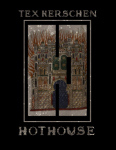 Hothouse
Hothouse
by Tex Kerschen
2011
84 pages / Free for download here
“Selections from the hothouse of the possible,” says the epigram to Tex Kerschen’s poetry collection, Hothouse. Recently, when I saw Kerschen read in Houston, he was accompanied by an opera singer, a six-year-old, a video installation and a smoke machine. As you might expect, he’s a gifted showman. That said, the possible Kerschen’s referring to doesn’t allude to stagecraft or even poetry, per se. Kerschen’s more ambitious than that. He wants to trick his readers into reconsidering what is possible.
It’s a soft sell. “Salvation sells itself,” these poems seem to say. “All I do is the paperwork.”
When Hothouse’s poems talk they drawl, unbalancing the reader with prolonged vowel sounds of narrative abstraction. At times they hold the reader at arm’s length; at times whisper in the reader’s ear with a hand in their hip pocket. By this sleight of hand Kerschen’s poems can look other than they are – seeming character studies in fatalism before surprising the reader with the possibility of redemption. They document the failings of human virtue and the plight of the human animal who toils and scratches in the aisles of 99 Cents Only Stores; searches for squandered youth in the clubs of Houston or Dublin to the ballads of Chamillionaire; retreats to the escapist fantasy of the Renaissance Festival and finds only wench-cleavage, neo-nazis and rigged jousting. But the purpose of this cataloging of human suffering is not, in fact, to simply bum you out. Like all good satire, it’s aim in enumerating humanity’s worst qualities is the restoration of human goodness: “I was all like / Where my dogs at? / They was all like, /At the pound / in a cage / waiting for a pinprick, / send magazines.”

Through Kerschen’s satirization of suffering – the probable, the predictable and the probably happening to the reader right now – the reader reevaluates how much more may be possible. In the process, some measure of convalescence from suffering is accomplished; as in the poem “Past Lives,” where several levels of narrative framing are at work to set up a joke, which may or may not be at the reader’s expense. The poem’s narrator recounts the high times had in Cleopatra’s court: “She was famous. I was rich. We traded gifts / of gold, lions and slaves.” When the listener (né reader) inquires about their own past life, they become the punchline: “Yes, you were there / You were cleaning up.” The direct address here implicates the reader in the poem, and thereby in the poem’s critique. Jokes on you. As Nietzsche’d say: only humans laugh, because only humans suffer so goddamn much they need a fucking laugh.
In Kerschen’s poems we suffer, because we know; and because we know, we can overcome suffering. But we don’t know everything, or more so, don’t allow ourselves to. Kerschen ties our unconscious knowing to animal instinct, signified in the bestiary of animals parading through these poems. Wild-life is a thing to be kept in check, a side of ourselves we to be suppressed. It’s the beard which grows back unbidden and must be shaved down anew each day, the dog in the cage. And yet it’s also this un-house-trainable aspect which offers emancipation from the cage; as an unexpected dolphin sighting does for two young lovers sitting on the beach burying their cigarette butts in the sand: “… I looked out at the water / and bit my tongue before telling you we wouldn’t / see dolphins, and there they were / beyond the swells / swimming in pairs / diving to eat / rising to breathe.” Kerschen, if not quite seeking reintegration, does encourage communion. “How many words should fit / on a line in a poem? / The time for half measures / has passed. Chance won’t see / that the dog gets fed.” The narrator hungers to know. The dog knows. It knows it’s hungry. But the only way either will eat Snausages tonight is to get a little work done.
October 18th, 2013 / 11:00 am
Interview with Christine Lee Zilka and Jennifer Derilo of the Kartika Review
I’ve always been curious about the darkroom where literary magazines come together. This is a series of interviews engaging, talking, and sometimes annoying editors about their magazines. How did they come about, what do they hate about editing, and what do they love most about it?
This is the third in the series and I talked with Fiction Editor, Christine Lee Zilka, and Creative Nonfiction editor, Jennifer Derilo. Their about page has the following description: “Kartika Review is a national literary arts magazine that publishes Asian Pacific Islander American fiction, poetry, creative non-fiction, and art. Kartika Review serves the Asian Pacific Islander American (APIA) community and those involved with Diasporic Asian and Pacific Islander-inspired literature. We scout for compelling APIA creative writing and artwork to present to the public at large. Our editors actively solicit contributions from established virtuosos in our community in hopes their works here will inspire the next generation of virtuosos. Kartika also promotes emerging writers and artists we foresee to be the future powerhouses of their craft. Ultimately, Kartika strives to create a literary forum that caters to and celebrates the wordsmiths of the Asian Diaspora.”
What’s always drawn me to the review is their focus on great stories. The APIA experience is incredibly diverse and the Kartika Review pushes the boundaries of what constitutes APIA literature. The settings may differ and so may some of the sentiments of the narrators, but at the core, the emotional resonance transcends any differences. The tales, poetry, essays, and imagery form a unique flotilla of art that is as portable as it is relatable. I hopped on board with the two editors and what followed was an organic and fun trek through the editorial rivers of the review.
***
As a brief bio and introduction to Christine (CLZ) and Jennifer (JD):

Christine Lee Zilka is the Fiction Editor at KARTIKA REVIEW. Her work has appeared in journals and anthologies such as ZYZZYVA, GUERNICA, VERBSAP, HYPHEN, and MEN UNDRESSED. She has a novel in progress.
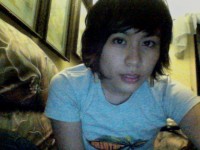
Jennifer Derilo is the Creative Nonfiction editor at Kartika Review. She has a memoir in progress. She often has nightmares about zombies. And abandoned predicate parts.
***
PTL: When and how did you first get involved with Kartika Review?
CLZ: I subbed a short story for consideration to Kartika in early 2008–and I got an email from Sunny Woan, our Founding Editor, saying she loved the piece and wanted to know if I would be interested in becoming Kartika’s Fiction Editor (the previous Fiction Editors departed after Kartika’s second issue). I told her yes! It was my call whether or not to have the piece published; I’m not a big proponent of editors publishing their own work at the litmag for which they work, so I withdrew the piece. The rest is history. I found a passion project in Kartika Review and a fantastic friend in Sunny. And recently, that story just got accepted for publication in another litmag. I owe a lot to that story.
JD: Christine and I were in the MFA program at Mills, but she was in the cohort ahead of me. I first met her when she was the TA for a teaching pedagogy class during my first semester in 2006. While she was an excellent TA, she also coaxed me out of my shell. I started to see her as a big sister type who had the best advice about classes, professors, the program itself, and eventually writing. We kept in touch after we both graduated (I kept going to her for advice!), and then sometime in 2008, Christine asked me to submit something to KR, but in true Jenn Derilo fashion, I never did. And then in 2009, she asked me to join because the CNF editor before me was moving onto other things. I’m sorry for all that backstory about my friendship with Christine, but if I didn’t initially glom onto her (ok…that’s not supposed to sound as creepy, stalker-ish, aggressive as it might), I don’t know that I would ever have been exposed to KR. I was such a writing/literary n00b when I started Mills, and I certainly knew nothing about APIA literature. But she talked about Kartika with such passion, and I was so impressed with the work they were doing, I couldn’t not join. I was supremely honored.
CZ: Jenn is modest. She’s an awesome writer. And has done amazing things as an editor at Kartika.
JD: Aw, shucks. Thank you. I’m lucky to be on an editorial board with multi-talented women of color. And I can’t stress that enough: women of color.
PTL: Christine, I really liked it when you said in regards to your editorial selections: “I often pick pieces by Asian Americans that aren’t API-centric. There are no rules, and Naomi Williams breaks them with brilliance.” What are some works that you both think exemplify Asian Pacific Islander American (APIA) literature, and how did those works affect and influence you?
CLZ: Twenty years ago, this question would have had a more clear cut answer. I would probably have said Maxine Hong Kingston’s WOMAN WARRIOR or Chang-rae Lee’s NATIVE SPEAKER. To that end, I’m motivated both as a writer and as an editor to broaden APIA literature. I’m happy to say there’s no single work that stands out to me, anymore. And I’m also happy that I’m a gatekeeper who gets to have a hand in diversifying the pool. I’m in front of a verrrry small gate, but it’s a gate, nonetheless.
JD: While I know this question is directed at Christine, I can’t help jumping in and agreeing with her, especially given that my knowledge of APIA literature was limited before joining KR. I even knew little about the APIA cannon. But what we do at KR is different. I do feel like we’re “diversifying the pool”, such as including the work of emerging writers alongside interviews with household names. We aren’t only publishing APIA writers who engage with APIA themes. I think Christine nails it when she says, “I’m happy to say that there’s no single work that stands out to me, anymore.” I mean, wow. What a brave discovery to voice! This is not to say that no submissions stand out because, clearly, we publish those pieces shake us. What’s important about that statement is that no one work encapsulates, defines, pigeonholes APIA literature. Rather each work broadens this scope.
PTL: I love the definition of “Kartika” as mentioned on the site: “In Vajrayana (or Tibetan) Buddhist tradition, the kartika, a crescent-shaped knife, symbolizes the cutting away of ignorance and superficiality, with the hopes that it will lead to enlightenment.” What are some themes and elements you both look for in the selections you make for short stories and non-fiction essays?
JD: I don’t know if this is cliche, but I’m attracted to creative nonfiction that surprises me. Even if submissions are about common themes, if the approach to language, structure, or voice is undeniably fresh or risky, I quickly gravitate toward them. It’s difficult to pinpoint exactly what floors me. The best way to understand my madness is to read our back issues starting with #6, which is, of course, when I joined.
CLZ: When I’m looking through the slushpile, pieces tend to blur into each other—so I too, am looking for something different. I’m looking for stories that hit something out of the ballpark, be it concept, structure, language, or ultimately, story. What haven’t I seen before?
Two Releases From Unlikely Books
Unlikely Books had two new releases in September, We’ll See Who Seduces Whom, with poetry by geniu-maniac wordsmith Tom Bradley, and truly twisted art by David Aronson; and Pleth, with textual poetry by Marthe Reed and artfully composed poetry cells by j/j hastain. Unlikely, which has been around as an online journal since 1998, began publishing books in 2005. After a relocation to Louisiana by Publisher Jonathan Penton in 2010, and a reevaluation of the current and upcoming publishing markets, neo-pulp online journal Unlikely has come back as Unlikely Stories: Episode IV, bigger and badder than ever, rebranding itself as a champion of transgressive literature.
Bizarro writer, political gadfly, prodigious poet Tom Bradley has done it again, once more turning the improbable into the compelling, showing us why he’s the guy mainstream writers wish they had the guts to be. This time, he goes it with a partner, nationally acclaimed artist David Aronson, who has perfected a quirky marriage between lowbrow and fine art elements. In Aronson’s art, Bradley found the perfect inspiration for his own unique brand of creative insanity. As Bradley told Aronson at one point in their long and fruitful association, “Each of your pictures contains a hundred different stories.”
In We’ll See Who Seduces Whom, Bradley explicates this statement by spinning hundreds of splintered tales based on Aronson’s pathologically delightful drawings. “We had one unspoken rule from the beginning,” says Bradley, “that I would have no conversation with the artist about the ‘meaning’ (if any) of his work.”
A complex and multi-layered dance between these two offbeat geniuses, We’ll See takes off in a high octane rampage, thunders across the defiled plains of Kansas, corners around the pope, takes multiple shots at our flabulous and star-struck culture, and brings you back home in time for a three-martini lunch, looking brain-raped and fuddled, woefully holding the book up and shaking it to see if anything more is to be had, secreted within its unholy pages.
“I invite you to unravel yourself,” says Bradley at one point, then proceeds to show the reader just how to accomplish that unraveling, with a flaying wit and a diabolical ability to pull half spun threads of story together and weave them into a sparse and breathtaking structure, balanced right on the precipice of reason. And then, in a change that occurs at the speed of light, lines come together into nice neat verses and hum along like down-scribed scat, smooth and charming and doing just what verses of poetry are supposed to do.
The interim sanity is never more than a quick flash, however, and soon Bradley begins another ascent into the heights of his own particularly cerebral madness, goaded on by Aronson’s precisely rendered and singularly disturbing images. Aronson takes the homey draftsmanship of an Edward Lear, and weds this deceptively innocuous style to clothonic images and odd juxtapositions of innocence and depravity, images from which Bradley wrings a universe entire of despair and death, demons and stinger-tailed angels to entice and horrify.
We’ll See Who Seduces Whom is a challenge from artist to writer and back again, and it’s impossible to read and not want to play along with Bradley and Aronson as they lob incendiary verbal and visual challenges at each other. In lesser hands a project like this could have devolved into self-absorbed dribble. But Aronson, who’s digital animation has been featured on MTV2 and Fuse and whose drawings and illustrations have appeared in Silkmilk, Ritual, Inside Artzine, Khooligan, and BigNews, has the sophistication to match well known poet and Bizarro author Bradley’s writing chops. In the end, it’s the reader who is wonderfully seduced into this amazing feast of words and images, coming away deliciously haunted and ready for more. A highly recommended read.
In Unlikely’s second offering, pleth, established poets j/j hastain and Marthe Reed collaborate on a work that is both visual and verbal. The title, a shortened form of the word plethora, is used by hastain to convey the writer’s multiple senses of self and as a reconfiguration of the he/she binary. Reed selected it as the title as a reference to the unfolding journey of gender awareness and identification captured within the book. The poems inside are smoky with intent, capturing the undulating dance of together/apart, brought to point by the fierce intellect of hastain and Reed.
hastain, well known for xyr cross-genre topics and post-gender advocacy, begins each call-and-response segment with collages that are both suggestive and introspective, drawing in the imagination with glimpses of sensual curves and ambiguous shadings and coloration – is that a hint of decay, or simply the delicate layering of tissue? Across each visual piece, hastain strews a spare handful of words, sometimes illuminating, sometimes an intriguing, intimate glimpse of internal dialog of pain and promise.
Marthe Reed, former creative writing program director at the University of Louisiana at Lafayette and co-publisher of Black Radish Books, then gives her textual response in poetry so carefully honed, so precisely luminous, that each word resonates – with hastain’s images, with per words, and with Reed’s own scrupulously crafted poetry. At its heart, pleth is a passionate dialog about the crash point between cyber-entropic dissipation and the regenerative power of connection.
There are complex nuances in both hastain’s and Reed’s work, fragmented glimpses of post-apocalyptic wounds, of a desperate last grasp at the tattered shreds of a brave new world’s disavowed humanity, but both hastain and Reed offer, above all else, a sense of beauty, and of hope that shines through.
In a 2011 interview with Rob McLennan, Reed says modestly that it is not clear to her that poetry is any effective means of grappling with the larger social issues of the society around her. But it appears that in pleth, she has found her place. “We are …” Reed says, “tangent velocities abrading the knots.”
—
Deb Hoag is a writer with several published novels, including Queer and Loathing on the Yellow Brick Road and Crashin’ the Real, and the editor of Women Writing the Weird, an anthology of weird fiction by writers identifying as women. Her novels, as well as Women Writing the Weird and Women Writing the Weird II: Dreadful Daughters, are available at Dog Horn Publishing.
Recognizing Beauty: An Attempt to Connect What I love About Jazz, Poetry, Drag, Film & Pittsburgh, PA
Thanks to Connor Hestdalen and Sara Coffey for introducing me to everyone and everything and to Janice Lee for giving me this space to gather.
**

I fell in love with Moon Baby the same way I fell in love with poetry, my partner, jazz and the city of Pittsburgh.
I was sleeping with the polished veneers and parallel streets of Columbus where I was writing short poetic verse and making even shorter abstract films. But secretly, I was dreaming of the crumbling storefronts and uneven landscapes that embodied Pittsburgh.
I was in love with the humble way Pittsburgh presented itself and directly was turned off by the willingness of Columbus to replace a historic building with a new ATM. (Don’t get me wrong, Columbus is a great city with a lot going on and stands alone as an incredibly accepting Queer Mecca for the small towns and states that surround it and I’m not here to be too hard on the place, but rather I am here in an attempt to figure out what made Pittsburgh so captivating.)

On one fateful visit to Pittsburgh I was led to an event put on by the jazz dancers of the Pillow Project and it was through their instinctive movements and intuitive collaboration that I was first able to formulate what I wanted from my surroundings.
I proceeded to visit monthly for these jazz nights, excited by the possibility to witness a physical embodiment of the beauty that I was seeing ooze from the broken bricks and old steel.
By planning my trips around these Second Saturday performances, I was inadvertently shaping my Pittsburgh to be a community of artists and doers motivated to work together to fulfill meaningful projects and works of art. So when I was felicitously freed from the shackles of higher education I naturally and quite thoughtlessly announced my move to Pittsburgh. It wasn’t a week later that my roommates had found my replacement and I was bound by my impassioned proposal. Without a plan or a home or a job I moved across state lines armed only with film cameras and a jazz-influenced disposition that shaped the way I interacted with and viewed the people I met. I was to start seeing the people I met not just as friends and acquaintances but more importantly as potential partners in both art and love.
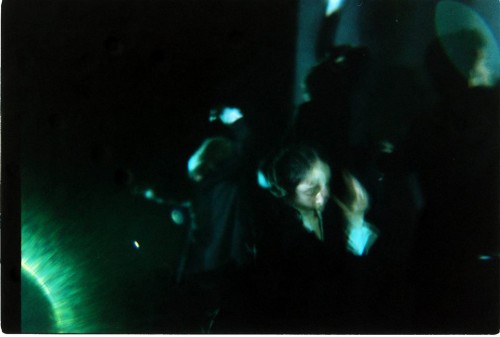
Pillow Project’s improvisational example solidified my views of Pittsburgh and a TED talk on embracing vulnerability in your everyday by Brené Brown helped me put a word to what I was finding beautiful in Pittsburgh’s unfinished appearance.
Vulnerability literally means being able to be wounded. And in the unguarded and honest people I was beginning to connect with in my new city I was seeing the same thing that I had been referring to as Pittsburgh.
In Columbus I had worked with some talented artists and queens, particularly Mathilda Longfellow, with whom I’ve finished some beautiful and hilarious work. I didn’t have that same familiarity with Pittsburgh’s drag scene, but my partner knew and introduced me to Moon Baby with a hunch that we’d work together well.
There is a term in the drag community called gagging, meaning to enjoy a queen so thoroughly you could choke and die on them. I was gagged quite literally the first night I saw Moon Baby perform as she dance, lip-synced and ate her own pubes. But it was through those tears of disgust and awe that I recognized the same vulnerability that I cultivating myself. READ MORE >
October 10th, 2013 / 11:00 am
